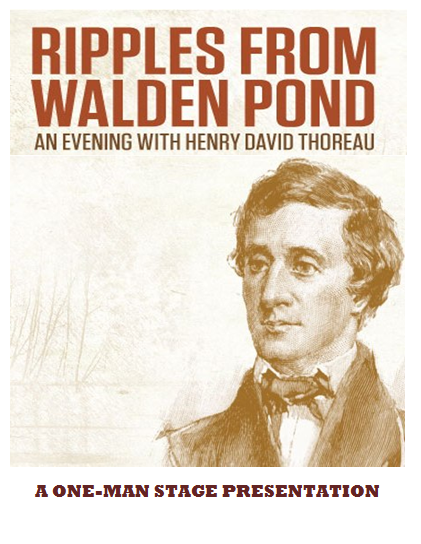Ripples From Walden Pond:
On Playing Henry Thoreau
Overview: Henry Thoreau was a vibrant, opinionated man, his passions always simmering just beneath the surface, restrained only by a perilously thin cord of stoicism and reason, which when snapped, as it often was by the folly of his fellow man, overflowed in laughter or sorrow or anger. His view of the world was almost Manichean in its dichotomy of good and evil, though he was always open to the opposing views of people he respected. There were precious few of them. His passions ran deeply through everything he loved: his brother John, Ellen Sewell, his friends, books and ideas, and the natural world. They also ran deeply through his hatreds: of slavery, disingenuousness, mindless obedience to the established rules of society, and the cant and hypocrisy of people who would not live what they said they believed. The youthful enthusiasm with which he pursued his interests remained with him to the end of his life. He looks at Walden Pond like a young lover looks at the object of his romantic desire: he is entranced, devoted, overwhelmed, rejoicing in both the beauty of his lover and in his own devotion. When in doubt as to how to play him, turn up the volume. The modern audience has been bludgeoned by sensory experiences of every kind, and is thus resistant to subtlety.
Thoreau’s writing reflects an elevated moral purpose, a low expectation of others, and a fine sense of humor, which is often overlooked. He grasped ideas in bitter earnest, yet, while willing to pass judgment on his fellow men, he applied unflinchingly the same standard of measure to himself, and retained a pronounced and laudable ability to laugh at his own shortcomings and idiosyncrasies. This should be kept constantly in mind, as it is this quality that makes him a likeable man rather than a self-righteous prig, and provides much of the humor. For example: when Thoreau acknowledges that no one ever wanted to publish his books, and with good reason, or when he realizes that the audience is not having quite the experience he is having when he tells them to look at Walden Pond. He has left them behind in this flight of fancy, and suddenly realizes that they are not looking at the pond but at him. Their pleasure is vicarious. They are mere spectators. They have not followed him to the heights that he has traveled. When he returns to earth the humor implicit in this realization is enhanced by the height to which his passions have taken him.
Physical appearance: Thoreau was thin and just below medium height. Fidelity to this fact is not essential as few people are aware of his physical appearance. His posture was erect, his walk self-assured. Everyone who knew him and left an account remarked on the depth of thought always evident in his large, expressive, blue-gray eyes. He was physically unobtrusive, yet he was a man everyone noticed. He was clean-shaven for most of his life, adopting a ‘Galway’ beard (whiskers about the throat, with cheeks, jaw and upper lip clean-shaven) in his late thirties, and a full beard and mustache in his last years. He wore his collar turned down when wearing a tie, like Emerson, which was a new fashion in mid-nineteenth-century America. He was careless of his appearance; his clothing was often of coarse home-made fabric, and usually worn, but sturdy, durable, and clean. He would often clench his hand in a fist when speaking in earnest.
Characteristics and personality traits: Thoreau was a man of reason (the Greek influence in his classical education) with a romantic soul constantly kept in check by a passion for self-control and order. His mind operated with a fine interplay of intuition and empiricism, both enhancing his extraordinary powers of observation. As with many people of his time and place, his Puritan heritage is evident in his asceticism, his austerity, and his demand that all writing be first and foremost sincere. His distaste for the Yankee single-mindedness of commercial speculation ran deeply. He loved the sensual experience of nature as an end in itself and as a means to a deeper, fundamental understanding of reality. He was regarded by everyone who knew him as utterly trustworthy. Children loved him. As a teacher he inspired in his students both comfort and respect. He was forthright, honest, direct, and gave the impression that he was not a man to trifle with. He was not a man in a hurry.
He was chaste, prudish by modern standards, and slightly so even by the standards of his time, though his feeling was derived less from fastidiousness than from a desire to achieve self-control, something he greatly respected in others, and from a Platonic quest for an Ideal Love. He found promiscuity, or as he would have called it, moral laxity, extremely distasteful. He loathed dirty jokes. His sense of sexual morality was Victorian, though he applauded the direct way that Hindus discuss sexuality, and loved Whitman’s Leaves of Grass, which in its sexually explicit content shocked almost everyone else. He was temperate in the original Christian sense of “moderate”. He never touched alcohol, tobacco, or caffeine, his abstemiousness due not merely to asceticism but to the desire to keep his senses sharp for the best of life; thus, he avoided liquor better to enjoy water, and snuff better to enjoy flowers.
Never a joiner or a follower, he was suspicious of the tendency of organizations to restrict his personal liberty, even those whose goals mirrored his own, but was not interested in being a leader, thinking his own internal reformation of self quite sufficient a task to occupy him. He accepted no one’s word for empirical or philosophical truth without independent observation or introspection. He was prickly, independent, and enjoyed holding contrary opinions.
He thought novels a waste of time, ignored contemporary belles lettres, but was seldom without a book, preferring science, history, philosophy, natural history, and travel, particularly before setting off on a journey, reading everything about his destination that was available before departing. He was perhaps the finest Greek classicist of his generation in Concord, and continued to read Latin and Greek all his life.
Critical Moments in the Presentation: There are two supremely dramatic moments in the presentation. The first comes with the loss of Ellen Sewell, the only woman he would ever love, and the death of his brother and closest friend, John. This is the crippling trauma that sends him fleeing to the woods. It is the transformative experience of his life. When he goes to see Emerson, he is fragile, shaken, desperately trying to keep his emotions in check, and with limited success.
The second great emotional moment in the presentation occurs as Thoreau is departing. Having spent most of his life regarded as a failure, and having struggled with the self-doubt that surely accompanied this regard, he is almost overcome with the realization that he has not simply lived for himself, but has left behind an extraordinary gift. He has made a difference. His departure is buoyant: the grateful, joyful, triumphant humility of a man who has come through adversity and neglect, and seen that he has served his fellow man, and has served well.
On Transcendentalism: Transcendentalism (the belief that not all knowledge can be derived through reason, logic, empiricism, or the senses, but rather that there is another kind of innate knowing, accessible through introspection and intuition, that can ‘transcend’ the mere perception of reality given us by our senses) is omitted due to its relative lack of interest for a modern audience and considerations of space. Thoreau’s metaphysical views were in flux all his life. He was more of a seer than a theologian. He is not given a Christian caste, as this would have enraged him. He was neither a nominal Christian nor a member of any church, though the Unitarians claimed him, quite literally: they buried him. He never shook off his Puritan heritage, though, and his prose is awash with the fine Elizabethan cadences of the King James Bible. He often conceived of intent or benevolence in nature, commonly used the words “Nature” and “God” interchangeably, though he never made the logical step from intent to Intender; but he came close. He was, above all, forever in search of a Platonic ideal, and preoccupied with the translation of higher thought into action.
A Final Note for the Actor:
The text has been painstakingly and meticulously punctuated. Absolute fidelity to the text and to the punctuation is essential to a successful presentation.
Further reading: The best place to start is, of course, with Walden; Richardson’s Henry David Thoreau: A Life of the Mind is the most balanced and insightful, as well as the most readable biography.


